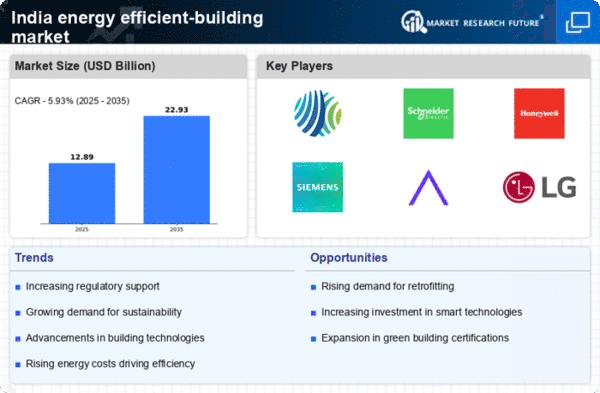Rising Energy Costs
The escalating costs of energy in India are significantly influencing the energy efficient-building market. With energy prices rising steadily, both consumers and businesses are increasingly seeking ways to reduce their energy consumption. This trend is prompting a shift towards energy-efficient buildings, which can substantially lower utility bills. Reports indicate that energy-efficient buildings can reduce energy consumption by up to 30-50%, making them an attractive option for cost-conscious developers and homeowners. The energy efficient-building market is thus witnessing a surge in demand as stakeholders recognize the long-term financial benefits associated with energy-efficient designs and technologies.
Increased Focus on Sustainability
There is a growing emphasis on sustainability within the construction sector in India, which is significantly impacting the energy efficient-building market. Stakeholders, including developers, architects, and consumers, are increasingly prioritizing sustainable practices in building design and construction. This shift is driven by a combination of environmental awareness and regulatory pressures. The energy efficient-building market is responding to this trend by offering solutions that not only meet energy efficiency standards but also promote sustainable living. As a result, the market is likely to see a rise in certifications such as LEED and GRIHA, which further incentivize the adoption of energy-efficient practices.
Government Initiatives and Policies
The energy efficient-building market in India is experiencing a notable boost due to various government initiatives and policies aimed at promoting sustainability. The Indian government has implemented programs such as the Energy Conservation Building Code (ECBC), which sets minimum energy performance standards for commercial buildings. Additionally, the Perform, Achieve and Trade (PAT) scheme encourages energy efficiency in large industries. These initiatives not only enhance compliance but also stimulate investment in energy-efficient technologies. As of 2025, the market is projected to grow at a CAGR of approximately 10%, driven by these supportive policies. The energy efficient-building market is thus positioned to benefit from ongoing governmental support, which is likely to enhance the overall market landscape.
Technological Advancements in Construction
The energy efficient-building market is being propelled forward by technological advancements in construction methods and materials. Innovations such as smart building technologies, energy-efficient HVAC systems, and sustainable building materials are becoming increasingly prevalent. These technologies not only enhance the energy performance of buildings but also improve occupant comfort and reduce operational costs. The energy efficient-building market is likely to benefit from the integration of these advanced technologies, which can lead to energy savings of up to 40%. As builders and developers adopt these innovations, the market is expected to expand, reflecting a growing commitment to sustainability.
Urbanization and Infrastructure Development
India's rapid urbanization is a critical driver for the energy efficient-building market. As urban populations continue to swell, the demand for housing and commercial spaces is increasing exponentially. This urban expansion necessitates the construction of energy-efficient buildings to accommodate the growing populace while minimizing environmental impact. The energy efficient-building market is likely to see a significant uptick in projects that prioritize sustainability and energy efficiency. According to estimates, urban areas in India are expected to account for over 60% of the total energy consumption by 2030, underscoring the urgent need for energy-efficient solutions in new developments.
















